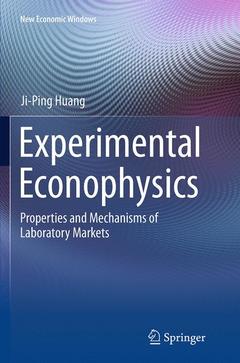Experimental Econophysics, 2015 Properties and Mechanisms of Laboratory Markets New Economic Windows Series
Auteur : Huang Ji-Ping

Experimental Econophysics describes the method of controlled human experiments, which is developed by physicists to study some problems in economics or finance, namely, stylized facts, fluctuation phenomena, herd behavior, contrarian behavior,
hedge behavior, cooperation, business cycles, partial information, risk management, and stock prediction. Experimental econophysics together with empirical econophysics are two branches of the field of econophysics. The latter one has been
extensively discussed in the existing books, while the former one has been seldom touched. In this book, the author will focus on the branch of experimental econophysics.
Empirical econophysics is based on the analysis of data in real markets by using some statistical tools borrowed from traditional statistical physics. Differently, inspired by the role of controlled experiments and system modelling (for computer simulations and/or analytical theory) in developing modern physics, experimental econophysics specially relies on controlled human experiments in the laboratory (producing data for analysis) together with agent-based modelling (for computer simulations and/or analytical theory), with an aim at revealing the general
cause-effect relationship between specific parameters and emergent properties of real economic/financial markets. This book covers the basic concepts, experimental methods, modelling approaches, and latest progress in the field of experimental
econophysics.
J. P. Huang received the Ph.D degree in Physics from The Chinese University of Hong Kong, Hong Kong, China, in 2003. Since 2005, he has been a Professor in the Department of Physics, Fudan University, Shanghai, China. He was a Research Fellow of the Alexander von Humboldt foundation (Germany) in 2004–2005. His current research interests include econophysics and soft matter physics. His homepage: http://www.physics.fudan.edu.cn/tps/people/jphuang/new/.
Covers the basic concepts, experimental methods, and modelling approaches of econophysics
Presents the latest progress in the field of econophysics
Introduces experimental econophysics with a focus on controlled human experiments
Serves as both a reference work for senior researchers and a study text for graduate students
Includes supplementary material: sn.pub/extras
Date de parution : 09-2016
Ouvrage de 192 p.
15.5x23.5 cm
Disponible chez l'éditeur (délai d'approvisionnement : 15 jours).
Prix indicatif 52,74 €
Ajouter au panierDate de parution : 08-2014
Ouvrage de 192 p.
15.5x23.5 cm
Disponible chez l'éditeur (délai d'approvisionnement : 15 jours).
Prix indicatif 52,74 €
Ajouter au panierThème d’Experimental Econophysics :
Mots-clés :
Agent-based Modeling; Arbitrage Opportunities; Complex Adaptive System; Computer-aided Controlled Human Experiments; Controlled Experiment; Emergent Property; Fluctuation Phenomena; Human Market Behavior; Laboratory Market; Risk Management; data-driven science; modeling and theory building; complexity



